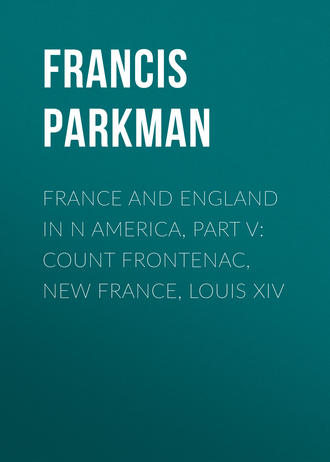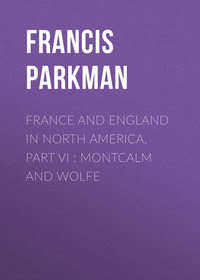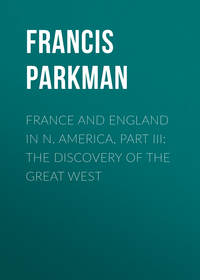 полная версия
полная версияFrance and England in N America, Part V: Count Frontenac, New France, Louis XIV
Frontenac shared the spirit of the hour. His first step was to survey his government. He talked with traders, colonists, and officials; visited seigniories, farms, fishing-stations, and all the infant industries that Talon had galvanized into life; examined the new ship on the stocks, admired the structure of the new brewery, went to Three Rivers to see the iron mines, and then, having acquired a tolerably exact idea of his charge, returned to Quebec. He was well pleased with what he saw, but not with the ways and means of Canadian travel; for he thought it strangely unbecoming that a lieutenant-general of the king should be forced to crouch on a sheet of bark, at the bottom of a birch canoe, scarcely daring to move his head to the right or left lest he should disturb the balance of the fragile vessel.
At Quebec he convoked the council, made them a speech, and administered the oath of allegiance. 14 This did not satisfy him. He resolved that all Quebec should take the oath together. It was little but a pretext. Like many of his station, Frontenac was not in full sympathy with the centralizing movement of the time, which tended to level ancient rights, privileges, and prescriptions under the ponderous roller of the monarchical administration. He looked back with regret to the day when the three orders of the state, clergy, nobles, and commons, had a place and a power in the direction of national affairs. The three orders still subsisted, in form, if not in substance, in some of the provinces of France; and Frontenac conceived the idea of reproducing them in Canada. Not only did he cherish the tradition of faded liberties, but he loved pomp and circumstance, above all, when he was himself the central figure in it; and the thought of a royal governor of Languedoc or Brittany, presiding over the estates of his province, appears to have fired him with emulation.
He had no difficulty in forming his order of the clergy. The Jesuits and the seminary priests supplied material even more abundant than he wished. For the order of the nobles, he found three or four gentilshommes at Quebec, and these he reinforced with a number of officers. The third estate consisted of the merchants and citizens; and he formed the members of the council and the magistrates into another distinct body, though, properly speaking, they belonged to the third estate, of which by nature and prescription they were the head. The Jesuits, glad no doubt to lay him under some slight obligation, lent him their church for the ceremony that he meditated, and aided in decorating it for the occasion. Here, on the twenty-third of October, 1672, the three estates of Canada were convoked, with as much pomp and splendor as circumstances would permit. Then Frontenac, with the ease of a man of the world and the loftiness of a grand seigneur, delivered himself of the harangue he had prepared. He wrote exceedingly well; he is said also to have excelled as an orator; certainly he was never averse to the tones of his own eloquence. His speech was addressed to a double audience: the throng that filled the church, and the king and the minister three thousand miles away. He told his hearers that he had called the assembly, not because he doubted their loyalty, but in order to afford them the delight of making public protestation of devotion to a prince, the terror of whose irresistible arms was matched only by the charms of his person and the benignity of his rule. "The Holy Scriptures," he said, "command us to obey our sovereign, and teach us that no pretext or reason can dispense us from this obedience." And, in a glowing eulogy on Louis XIV., he went on to show that obedience to him was not only a duty, but an inestimable privilege. He dwelt with admiration on the recent victories in Holland, and held forth the hope that a speedy and glorious peace would leave his Majesty free to turn his thoughts to the colony which already owed so much to his fostering care. "The true means," pursued Frontenac, "of gaining his favor and his support, is for us to unite with one heart in laboring for the progress of Canada." Then he addressed, in turn, the clergy, the nobles, the magistrates, and the citizens. He exhorted the priests to continue with zeal their labors for the conversion of the Indians, and to make them subjects not only of Christ, but also of the king; in short, to tame and civilize them, a portion of their duties in which he plainly gave them to understand that they had not hitherto acquitted themselves to his satisfaction. Next, he appealed to the nobles, commended their gallantry, and called upon them to be as assiduous in the culture and improvement of the colony as they were valiant in its defence. The magistrates, the merchants, and the colonists in general were each addressed in an appropriate exhortation. "I can assure you, messieurs," he concluded, "that if you faithfully discharge your several duties, each in his station, his Majesty will extend to us all the help and all the favor that we can desire. It is needless, then, to urge you to act as I have counselled, since it is for your own interest to do so. As for me, it only remains to protest before you that I shall esteem myself happy in consecrating all my efforts, and, if need be, my life itself, to extending the empire of Jesus Christ throughout all this land, and the supremacy of our king over all the nations that dwell in it."
He administered the oath, and the assembly dissolved. He now applied himself to another work: that of giving a municipal government to Quebec, after the model of some of the cities of France. In place of the syndic, an official supposed to represent the interests of the citizens, he ordered the public election of three aldermen, of whom the senior should act as mayor. One of the number was to go out of office every year, his place being filled by a new election; and the governor, as representing the king, reserved the right of confirmation or rejection. He then, in concert with the chief inhabitants, proceeded to frame a body of regulations for the government of a town destined, as he again and again declares, to become the capital of a mighty empire; and he farther ordained that the people should hold a meeting every six months to discuss questions involving the welfare of the colony. The boldness of these measures will scarcely be appreciated at the present day. The intendant Talon declined, on pretence of a slight illness, to be present at the meeting of the estates. He knew too well the temper of the king, whose constant policy it was to destroy or paralyze every institution or custom that stood in the way of his autocracy. The despatches in which Frontenac announced to his masters what he had done received in due time their answer. The minister Colbert wrote: "Your assembling of the inhabitants to take the oath of fidelity, and your division of them into three estates, may have had a good effect for the moment; but it is well for you to observe that you are always to follow, in the government of Canada, the forms in use here; and since our kings have long regarded it as good for their service not to convoke the states-general of the kingdom, in order, perhaps, to abolish insensibly this ancient usage, you, on your part, should very rarely, or, to speak more correctly, never, give a corporate form to the inhabitants of Canada. You should even, as the colony strengthens, suppress gradually the office of the syndic, who presents petitions in the name of the inhabitants; for it is well that each should speak for himself, and no one for all." 15
Here, in brief, is the whole spirit of the French colonial rule in Canada; a government, as I have elsewhere shown, of excellent intentions, but of arbitrary methods. Frontenac, filled with the traditions of the past, and sincerely desirous of the good of the colony, rashly set himself against the prevailing current. His municipal government, and his meetings of citizens, were, like his three estates, abolished by a word from the court, which, bold and obstinate as he was, he dared not disobey. Had they been allowed to subsist, there can be little doubt that great good would have resulted to Canada.
Frontenac has been called a mere soldier. He was an excellent soldier, and more besides. He was a man of vigorous and cultivated mind, penetrating observation, and ample travel and experience. His zeal for the colony, however, was often counteracted by the violence of his prejudices, and by two other influences. First, he was a ruined man, who meant to mend his fortunes; and his wish that Canada should prosper was joined with a determination to reap a goodly part of her prosperity for himself. Again, he could not endure a rival; opposition maddened him, and, when crossed or thwarted, he forgot every thing but his passion. Signs of storm quickly showed themselves between him and the intendant Talon; but the danger was averted by the departure of that official for France. A cloud then rose in the direction of the clergy.
"Another thing displeases me," writes Frontenac, "and this is the complete dependence of the grand vicar and the seminary priests on the Jesuits, for they never do the least thing without their order: so that they (the Jesuits) are masters in spiritual matters, which, as you know, is a powerful lever for moving every thing else." 16 And he complains that they have spies in town and country, that they abuse the confessional, intermeddle in families, set husbands against wives, and parents against children, and all, as they say, for the greater glory of God. "I call to mind every day, Monseigneur, what you did me the honor to say to me when I took leave of you, and every day I am satisfied more and more of the great importance to the king's service of opposing the slightest of the attempts which are daily made against his authority." He goes on to denounce a certain sermon, preached by a Jesuit, to the great scandal of loyal subjects, wherein the father declared that the king had exceeded his powers in licensing the trade in brandy when the bishop had decided it to be a sin, together with other remarks of a seditious nature. "I was tempted several times," pursues Frontenac, "to leave the church with my guards and interrupt the sermon; but I contented myself with telling the grand vicar and the superior of the Jesuits, after it was over, that I was very much surprised at what I had heard, and demanded justice at their hands. They greatly blamed the preacher, and disavowed him, attributing his language, after their custom, to an excess of zeal, and making many apologies, with which I pretended to be satisfied; though I told them, nevertheless, that their excuses would not pass current with me another time, and, if the thing happened again, I would put the preacher in a place where he would learn how to speak. Since then they have been a little more careful, though not enough to prevent one from always seeing their intention to persuade the people that, even in secular matters, their authority ought to be respected above any other. As there are many persons here who have no more brains than they need, and who are attached to them by ties of interest or otherwise, it is necessary to have an eye to these matters in this country more than anywhere else." 17
The churchmen, on their part, were not idle. The bishop, who was then in France, contrived by some means to acquaint himself with the contents of the private despatches sent by Colbert in reply to the letters of Frontenac. He wrote to another ecclesiastic to communicate what he had learned, at the same time enjoining great caution; "since, while it is well to acquire all necessary information, and to act upon it, it is of the greatest importance to keep secret our possession of such knowledge." 18
The king and the minister, in their instructions to Frontenac, had dwelt with great emphasis on the expediency of civilizing the Indians, teaching them the French language, and amalgamating them with the colonists. Frontenac, ignorant as yet of Indian nature and unacquainted with the difficulties of the case, entered into these views with great heartiness. He exercised from the first an extraordinary influence over all the Indians with whom he came in contact; and he persuaded the most savage and refractory of them, the Iroquois, to place eight of their children in his hands. Four of these were girls and four were boys. He took two of the boys into his own household, of which they must have proved most objectionable inmates; and he supported the other two, who were younger, out of his own slender resources, placed them in respectable French families, and required them to go daily to school. The girls were given to the charge of the Ursulines. Frontenac continually urged the Jesuits to co-operate with him in this work of civilization, but the results of his urgency disappointed and exasperated him. He complains that in the village of the Hurons, near Quebec, and under the control of the Jesuits, the French language was scarcely known. In fact, the fathers contented themselves with teaching their converts the doctrines and rites of the Roman Church, while retaining the food, dress, and habits of their original barbarism.
In defence of the missionaries, it should be said that, when brought in contact with the French, the Indians usually caught the vices of civilization without its virtues; but Frontenac made no allowances. "The Jesuits," he writes, "will not civilize the Indians, because they wish to keep them in perpetual wardship. They think more of beaver skins than of souls, and their missions are pure mockeries." At the same time he assures the minister that, when he is obliged to correct them, he does so with the utmost gentleness. In spite of this somewhat doubtful urbanity, it seems clear that a storm was brewing; and it was fortunate for the peace of the Canadian Church that the attention of the truculent governor was drawn to other quarters.
CHAPTER III
1673-1675Frontenac and PerrotLa Salle • Fort Frontenac • Perrot • His Speculations • His Tyranny • The Bush-rangers • Perrot revolts • Becomes alarmed • Dilemma of Frontenac • Mediation of Fénelon • Perrot in Prison • Excitement of the Sulpitians • Indignation of Fénelon • Passion of Frontenac • Perrot on Trial • Strange Scenes • Appeal to the King • Answers of Louis XIV. and Colbert • Fénelon rebuked.
Not long before Frontenac's arrival, Courcelle, his predecessor, went to Lake Ontario with an armed force, in order to impose respect on the Iroquois, who had of late become insolent. As a means of keeping them in check, and at the same time controlling the fur trade of the upper country, he had recommended, like Talon before him, the building of a fort near the outlet of the lake. Frontenac at once saw the advantages of such a measure, and his desire to execute it was stimulated by the reflection that the proposed fort might be made not only a safeguard to the colony, but also a source of profit to himself.
At Quebec, there was a grave, thoughtful, self-contained young man, who soon found his way into Frontenac's confidence. There was between them the sympathetic attraction of two bold and energetic spirits; and though Cavelier de la Salle had neither the irritable vanity of the count, nor his Gallic vivacity of passion, he had in full measure the same unconquerable pride and hardy resolution. There were but two or three men in Canada who knew the western wilderness so well. He was full of schemes of ambition and of gain; and, from this moment, he and Frontenac seem to have formed an alliance, which ended only with the governor's recall.
In telling the story of La Salle, I have described the execution of the new plan: the muster of the Canadians, at the call of Frontenac; the consternation of those of the merchants whom he and La Salle had not taken into their counsels, and who saw in the movement the preparation for a gigantic fur trading monopoly; the intrigues set on foot to bar the enterprise; the advance up the St. Lawrence; the assembly of Iroquois at the destined spot; the ascendency exercised over them by the governor; the building of Fort Frontenac on the ground where Kingston now stands, and its final transfer into the hands of La Salle, on condition, there can be no doubt, of sharing the expected profits with his patron. 19
On the way to the lake, Frontenac stopped for some time at Montreal, where he had full opportunity to become acquainted with a state of things to which his attention had already been directed. This state of things was as follows:—
When the intendant, Talon, came for the second time to Canada, in 1669, an officer named Perrot, who had married his niece, came with him. Perrot, anxious to turn to account the influence of his wife's relative, looked about him for some post of honor and profit, and quickly discovered that the government of Montreal was vacant. The priests of St. Sulpice, feudal owners of the place, had the right of appointing their own governor. Talon advised them to choose Perrot, who thereupon received the desired commission, which, however, was revocable at the will of those who had granted it. The new governor, therefore, begged another commission from the king, and after a little delay he obtained it. Thus he became, in some measure, independent of the priests, who, if they wished to rid themselves of him, must first gain the royal consent.
Perrot, as he had doubtless foreseen, found himself in an excellent position for making money. The tribes of the upper lakes, and all the neighboring regions, brought down their furs every summer to the annual fair at Montreal. Perrot took his measures accordingly. On the island which still bears his name, lying above Montreal and directly in the route of the descending savages, he built a storehouse, and placed it in charge of a retired lieutenant named Brucy, who stopped the Indians on their way, and carried on an active trade with them, to the great profit of himself and his associate, and the great loss of the merchants in the settlements below. This was not all. Perrot connived at the desertion of his own soldiers, who escaped to the woods, became coureurs de bois, or bush-rangers, traded with the Indians in their villages, and shared their gains with their commander. Many others, too, of these forest rovers, outlawed by royal edicts, found in the governor of Montreal a protector, under similar conditions.
The journey from Quebec to Montreal often consumed a fortnight. Perrot thought himself virtually independent; and relying on his commission from the king, the protection of Talon, and his connection with other persons of influence, he felt safe in his position, and began to play the petty tyrant. The judge of Montreal, and several of the chief inhabitants, came to offer a humble remonstrance against disorders committed by some of the ruffians in his interest. Perrot received them with a storm of vituperation, and presently sent the judge to prison. This proceeding was followed by a series of others, closely akin to it, so that the priests of St. Sulpice, who received their full share of official abuse, began to repent bitterly of the governor they had chosen.
Frontenac had received stringent orders from the king to arrest all the bush-rangers, or coureurs de bois; but, since he had scarcely a soldier at his disposal, except his own body-guard, the order was difficult to execute. As, however, most of these outlaws were in the service of his rival, Perrot, his zeal to capture them rose high against every obstacle. He had, moreover, a plan of his own in regard to them, and had already petitioned the minister for a galley, to the benches of which the captive bush-rangers were to be chained as rowers, thus supplying the representative of the king with a means of transportation befitting his dignity, and at the same time giving wholesome warning against the infraction of royal edicts. 20 Accordingly, he sent orders to the judge, at Montreal, to seize every coureur de bois on whom he could lay hands.
The judge, hearing that two of the most notorious were lodged in the house of a lieutenant named Carion, sent a constable to arrest them; whereupon Carion threatened and maltreated the officer of justice, and helped the men to escape. Perrot took the part of his lieutenant, and told the judge that he would put him in prison, in spite of Frontenac, if he ever dared to attempt such an arrest again. 21
When Frontenac heard what had happened, his ire was doubly kindled. On the one hand, Perrot had violated the authority lodged by the king in the person of his representative; and, on the other, the mutinous official was a rival in trade, who had made great and illicit profits, while his superior had, thus far, made none. As a governor and as a man, Frontenac was deeply moved; yet, helpless as he was, he could do no more than send three of his guardsmen, under a lieutenant named Bizard, with orders to arrest Carion and bring him to Quebec.
The commission was delicate. The arrest was to be made in the dominions of Perrot, who had the means to prevent it, and the audacity to use them. Bizard acted accordingly. He went to Carion's house, and took him prisoner; then proceeded to the house of the merchant Le Ber, where he left a letter, in which Frontenac, as was the usage on such occasions, gave notice to the local governor of the arrest he had ordered. It was the object of Bizard to escape with his prisoner before Perrot could receive the letter; but, meanwhile, the wife of Carion ran to him with the news, and the governor suddenly arrived, in a frenzy of rage, followed by a sergeant and three or four soldiers. The sergeant held the point of his halberd against the breast of Bizard, while Perrot, choking with passion, demanded, "How dare you arrest an officer in my government without my leave?" The lieutenant replied that he acted under orders of the governor-general, and gave Frontenac's letter to Perrot, who immediately threw it into his face, exclaiming: "Take it back to your master, and tell him to teach you your business better another time. Meanwhile you are my prisoner." Bizard protested in vain. He was led to jail, whither he was followed a few days after by Le Ber, who had mortally offended Perrot by signing an attestation of the scene he had witnessed. As he was the chief merchant of the place, his arrest produced a great sensation, while his wife presently took to her bed with a nervous fever.
As Perrot's anger cooled, he became somewhat alarmed. He had resisted the royal authority, and insulted its representative. The consequences might be serious; yet he could not bring himself to retrace his steps. He merely released Bizard, and sullenly permitted him to depart, with a letter to the governor-general, more impertinent than apologetic. 22
Frontenac, as his enemies declare, was accustomed, when enraged, to foam at the mouth. Perhaps he did so when he learned the behavior of Perrot. If he had had at command a few companies of soldiers, there can be little doubt that he would have gone at once to Montreal, seized the offender, and brought him back in irons; but his body-guard of twenty men was not equal to such an enterprise. Nor would a muster of the militia have served his purpose; for the settlers about Quebec were chiefly peaceful peasants, while the denizens of Montreal were disbanded soldiers, fur traders, and forest adventurers, the best fighters in Canada. They were nearly all in the interest of Perrot, who, if attacked, had the temper as well as the ability to make a passionate resistance. Thus civil war would have ensued, and the anger of the king would have fallen on both parties. On the other hand, if Perrot were left unpunished, the coureurs de bois, of whom he was the patron, would set no bounds to their audacity, and Frontenac, who had been ordered to suppress them, would be condemned as negligent or incapable.
Among the priests of St. Sulpice at Montreal was the Abbé Salignac de Fénelon, half-brother of the celebrated author of Télémaque. He was a zealous missionary, enthusiastic and impulsive, still young, and more ardent than discreet. One of his uncles had been the companion of Frontenac during the Candian war, and hence the count's relations with the missionary had been very friendly. Frontenac now wrote to Perrot, directing him to come to Quebec and give account of his conduct; and he coupled this letter with another to Fénelon, urging him to represent to the offending governor the danger of his position, and advise him to seek an interview with his superior, by which the difficulty might be amicably adjusted. Perrot, dreading the displeasure of the king, soothed by the moderate tone of Frontenac's letter, and moved by the assurances of the enthusiastic abbé, who was delighted to play the part of peace-maker, at length resolved to follow his counsel. It was mid-winter. Perrot and Fénelon set out together, walked on snow-shoes a hundred and eighty miles down the frozen St. Lawrence, and made their appearance before the offended count.







